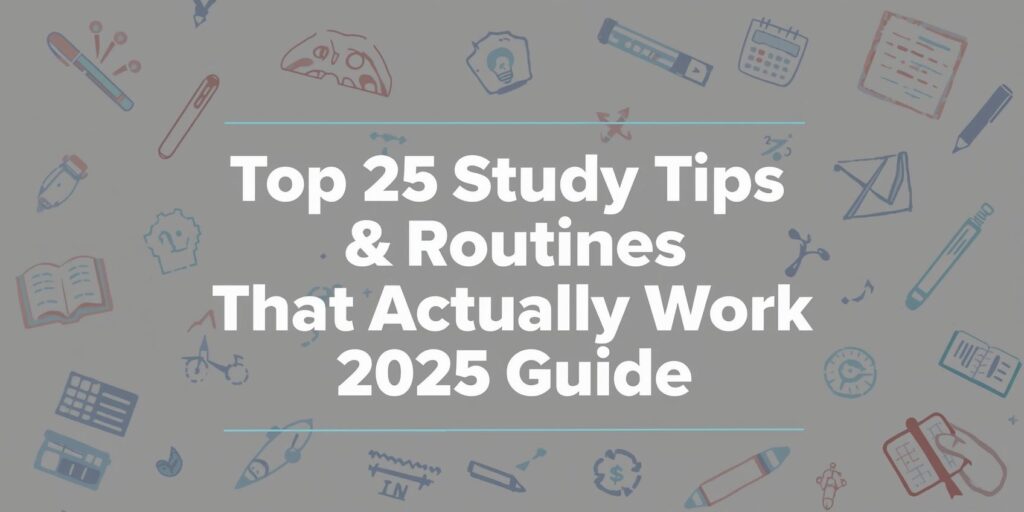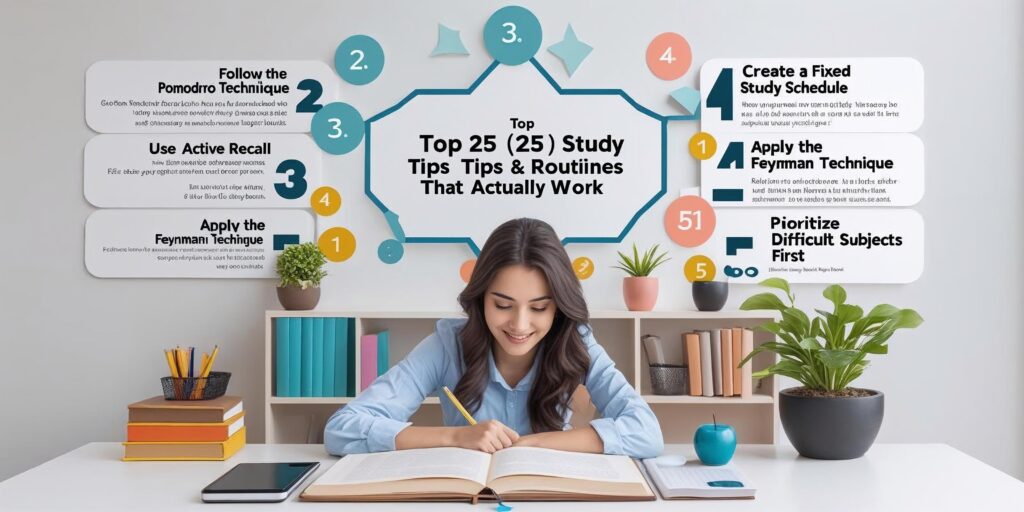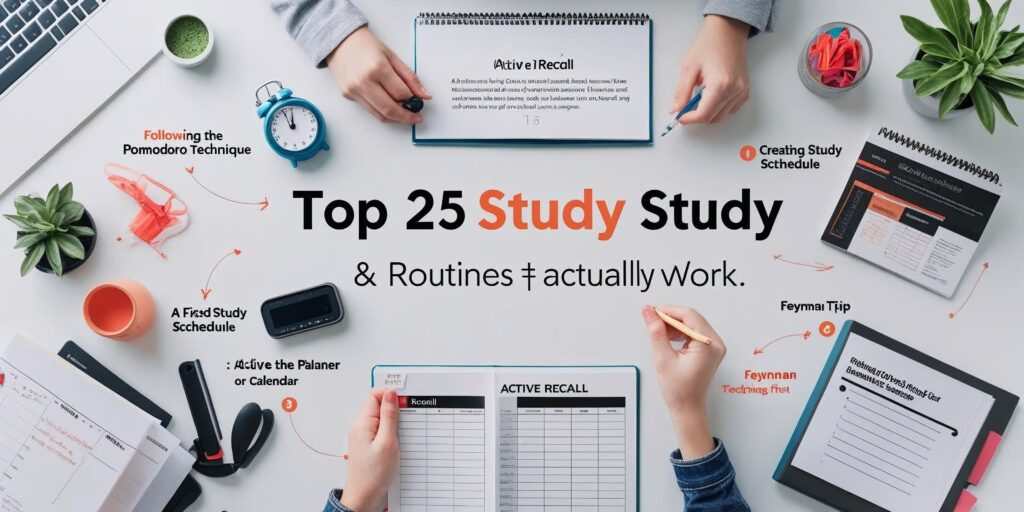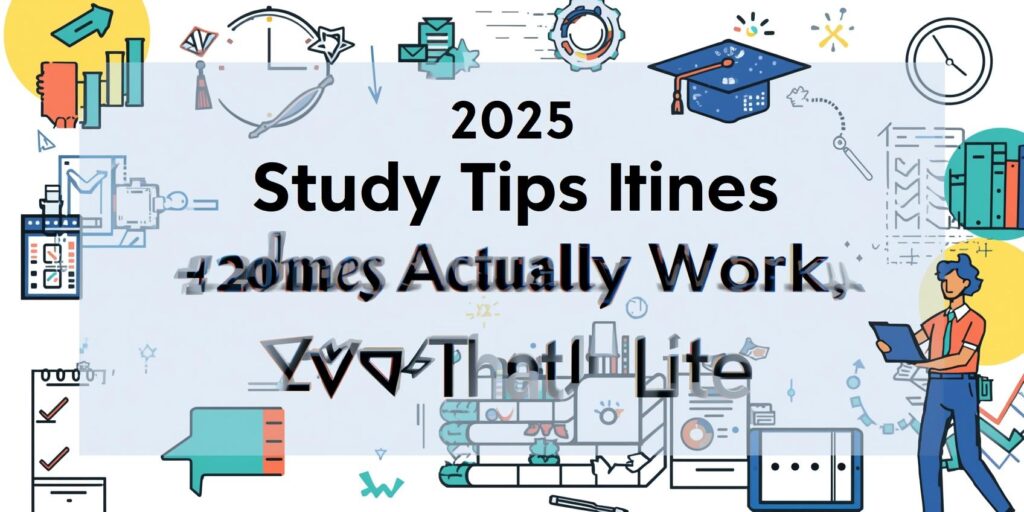
Top 25 Study Tips & Routines That Actually Work (2025 Guide)
In 2025, students face more distractions than ever—from endless social media feeds to online games and streaming platforms.
Yet, exams, competitive tests, and career opportunities are becoming even more challenging.
According to the UNESCO Global Education Report (2025), students who follow a structured study routine improve their retention rates by up to 40% compared to those who study randomly.
That means the right study habits can literally save you hours every week and help you score higher.
In this guide, we’ll explore 25 proven study tips and routines that have worked for school students, college students, and competitive exam aspirants worldwide.
Top 25 Study Tips & Routines That Actually Work

1. Follow the Pomodoro Technique
- Study for 25–30 minutes and take a 5-minute break.
- Helps maintain focus and prevents burnout.
- Best for: Students who get distracted easily.
2. Create a Fixed Study Schedule
- Decide exact times for daily study.
- Consistency trains your brain to enter “study mode” faster.
- Morning hours are great for theory; evenings for practice.
3. Use Active Recall
- Instead of rereading, test yourself on the topic.
- Flashcards, quizzes, and past papers work best.
- Proven to boost long-term retention.
4. Apply the Feynman Technique
- Teach a topic to an imaginary student (or your pet!).
- If you can explain it simply, you truly understand it.
5. Prioritize Difficult Subjects First
- Your mind is fresh at the start of the session.
- Tackling tough topics early reduces procrastination.
6. Use Mind Mapping
- Visual diagrams connect ideas and improve memory.
- Perfect for subjects like history, biology, and literature.
7. Study in Short, Focused Sessions
- Avoid marathon cramming.
- Break your study into 1–2 hour chunks with short breaks.
8. Optimize Your Study Space
- Quiet, well-lit, minimal distractions.
- Keep water nearby and your phone away.
9. Follow the 2x Rule for Review
- Review the same topic twice:
- First within 24 hours.
- Then after 7 days.
10. Combine Visual & Auditory Learning
- Watch videos, listen to podcasts, and then take notes.
- Works well for complex topics.
Top 25 Study Tips for College Students to Boost Productivity
11. Practice Spaced Repetition
- Use apps like Anki or Quizlet to schedule reviews.
- This technique locks info into long-term memory.
12. Mix Up Study Subjects
- Don’t stick to one subject for hours.
- Rotate subjects to stay mentally fresh.
13. Avoid Multitasking
- Turn off notifications.
- Study one thing at a time for better focus.
14. Set Clear Daily Goals
- Write down 3–5 key tasks each day.
- Tick them off for a sense of accomplishment.
15. Use Real Exam Conditions for Practice
- Set a timer, no notes, quiet space.
- Builds confidence for the actual exam day.
16. Stay Hydrated and Eat Brain-Boosting Foods
- Water, nuts, dark chocolate, and fruits.
- Avoid heavy junk food before study sessions.
17. Study During Your Peak Energy Hours
- Find your most alert time of the day.
- Morning people: study before noon.
- Night owls: study after sunset.
18. Take Smart Notes
- Use Cornell Note-Taking Method for organized notes.
- Highlight key points and write summaries.
19. Use Digital Tools Wisely
- Good: Grammarly, Notion, Evernote.
- Avoid: TikTok, Instagram during study time.
20. Keep a Study Journal
- Write what you studied, challenges, and improvements.
- Helps track progress over weeks.
21. Get Enough Sleep
- Memory consolidation happens during sleep.
- Aim for 7–8 hours before big exams.
22. Study with a Group (But Stay on Track)
- Group study works for problem-solving.
- Avoid gossip and distractions.
23. Reward Yourself
- Small treats after completing a target.
- Motivation booster for long study sessions.
24. Use Past Papers & Mock Tests
- Best way to predict exam patterns.
- Also reduces anxiety on exam day.
25. Keep Your Mind Positive
- Use affirmations: “I am capable of mastering this.”
- Stress can block memory — stay confident.
Here’s what to read next
Top 25 Fintech Jobs in India That Are Booming Right Now
Top 30 Money-Earning Apps Without Investment in 2025
Top 25 Soft Skills Employers Are Looking For Today
HDFC Credila Education Loan 2025
Study Timetable for Home: Daily Routine Tips That Work

Sample Daily Study Routine (2025)
Focus • Energy • ConsistencyA balanced day plan that prioritizes tough subjects early, scheduled breaks, and an evening wrap-up for next-day momentum.
| Time | Task |
|---|---|
| 6:30 AM | Wake up, light exercise |
| 7:00–9:00 AM | Tough subject (Math/Science) |
| 9:00–9:15 AM | Breakfast & short break |
| 9:15–11:00 AM | Revision of previous day’s topics |
| 11:00–1:00 PM | New lessons + note-taking |
| 1:00–2:00 PM | Lunch + short walk |
| 2:00–4:00 PM | Practice questions/mock test |
| 4:00–4:15 PM | Break/snack |
| 4:15–6:00 PM | Second subject (History/Languages) |
| 6:00–7:00 PM | Hobby time |
| 7:00–8:00 PM | Group study or discussion |
| 8:00–9:00 PM | Final quick revision + next day planning |
| 10:00 PM | Sleep |
Final Thoughts on Top 25 Study Tips & Routines That Actually Work (2025 Guide)

Studying effectively in 2025 isn’t about spending more hours—it’s about using those hours smarter.
By combining science-backed methods like Pomodoro, Active Recall, and Spaced Repetition with healthy lifestyle habits, you can transform your learning speed, retention, and exam performance.
Remember: Consistency beats intensity.
Start small, stay regular, and keep improving your routine.
Frequently Asked Questions
What is the 1/3, 5/7 rule in studying?
The 1/3, 5/7 rule in studying means you should review material one-third of the way through learning it and then five out of every seven days to strengthen memory and retention.
How to be a top 1% student?
To be a top 1% student, combine consistent smart study habits, active learning, and disciplined time management with a growth mindset and relentless curiosity.
How to bring 100% in an exam?
To score 100% in an exam, master the syllabus through consistent practice, active revision, solving past papers, and precise time management while staying calm and focused.
How can I focus 100% on studying?
You can focus 100% on studying by eliminating distractions, setting clear goals, using timed study sessions, and fully engaging your mind in the material.



